40 Years Later: The WHA Winnipeg Jets
See a 41-minute interview video at the bottom of the page!
On the 40th anniversary of the WHA's first game, October 11, 2012, five members of the original Winnipeg Jets squad gathered at the Winnipeg Free Press News Café in the heart of downtown Winnipeg for a night of reminiscing about their time with the Jets.
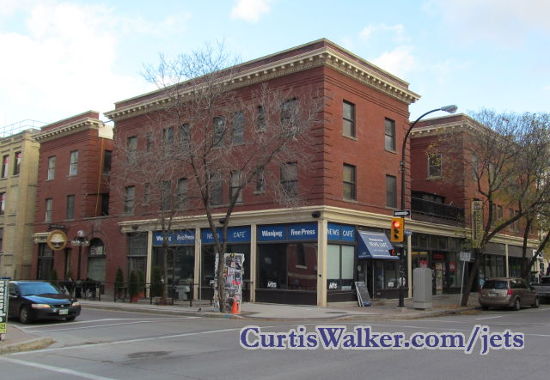
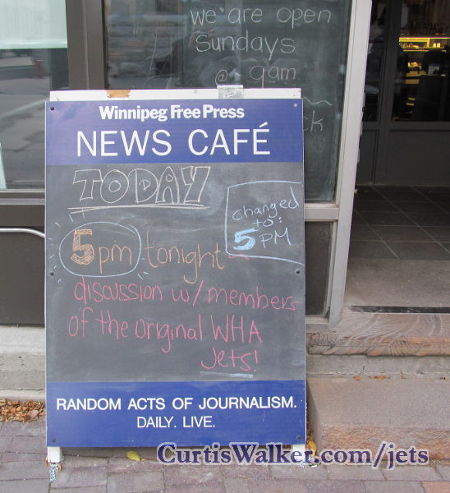
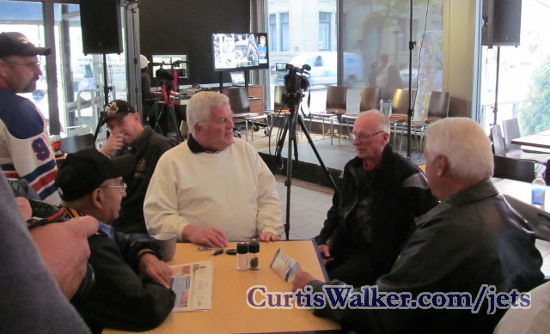
(left to right) George Smith, longtime Jets season ticket holder Mike Delaney, "Duke" Asmundson, Bill Sutherland, Dunc Rousseau.
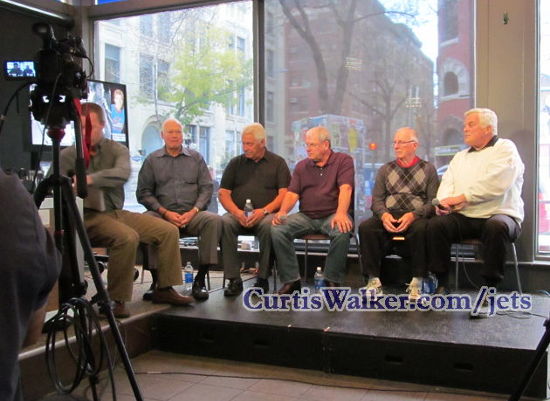
(left to right) Winnipeg Free Press reporter Geoff Kirbyson welcomes fromer WHA Jets Ab McDonald, Dunc Rousseau, Joe Daley, Bill Sutherland and Freeman “Duke” Asmundson to the stage in front of a gathering of nostalgic fans.
Regrettably, there was no formal event to commemorate this important historical event that would shape hockey history in Winnipeg for decades to come. However, as McDonald pointed out, “there wasn't really anything when we started out neither.”
Indeed, a crowd of only 1,721 fans were on hand when the Jets made their debut at the Winnipeg Arena against the Minnesota Fighting Saints to kick off the home portion of their exhibition schedule. There were over 8,000 in attendance when Jets made their regular season home debut, but the Jets never sold out the 10,000-seat Arena once during their inaugural season.
Regardless of how many people were watching during that first season, the Jets iced an outstanding team that was a very tight-knit group. Led by the Luxury Line of Bobby Hull, Christian Bordeleau and Norm Beaudin, along with a core of high-character veteran players, they went all the way to the AVCO Cup finals before bowing out in five games to the New England Whalers. That spirit of togetherness was still evident 40 years later as they spoke of each other like family.
They shared many stories, including one of their sing-a-longs at McDonald's house. Hockey players weren't the only invited guests, however. The legendary band The Guess Who once made an appearance.
Despite the impressive credentials, “they weren't as good as Ab,” said Daley.
Though Winnipeg hockey fans today would be hard-pressed to summon much praise for the Winnipeg Arena, the players enjoyed playing there. It must have looked like a palace compared to some of the places where they played on the road.
In the middle of the 1973-1974 season, the New York Golden Blades pulled up stakes and moved to the Cherry Hill Arena in New Jersey, just outside of Philadelphia. It had a hump at center ice and the players joked that the puck would take off when they would shoot from the red line. The dressing rooms were so small there that the players had to change at the hotel and carry their skates to the rink.
The International Amphitheater in Chicago, home of the Cougars for their three seasons in the WHA, was described as the “stock yards” by the players on stage.
“Man, it stunk in there,” said Daley.
On one occasion, the players had to walk across the same stage where they had been auctioning off animals the day before.
The WHA received a lot of media attention in 1972 for the lucrative contract that Hull signed at the corner of Portage and Main, but many of the Jets, including the five up on stage, were attracted to the new league not just for the money. It was a chance to play at home.
The original Jets squad was made up mostly of players with Manitoba heritage, something that they all spoke of with pride.
The players fondly remembered the late Bill Robinson, who passed away in 2008. Robinson was the former Director of Player Personnel, who was responsible for signing many on that original Jets' roster.
None of it all would have been possible without Jets' founder and co-owner Ben Hatskin. It was Hatskin who pursued Hull and eventually convinced him to sign a contract with the Jets that gave the infant league the boost it needed to get off the ground.
He was “gruff and, at times, cantankerous,” according to Daley, but “Benny had a tremendous good side to him.” Asmundson said that “he had a heart of gold.”
After nearly an hour and a half talking about those early Jets teams, all five of the original Jets on stage wound up the evening expressing nothing but positive sentiments about their experiences. To a man, they were thankful, grateful and proud to have been on that team.
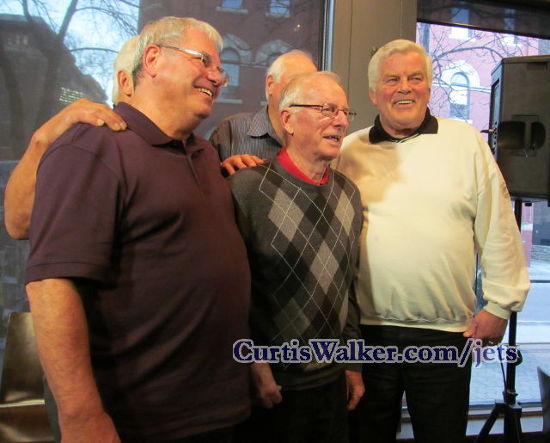
“It was the best seven years I spent in my life,” said Daley.
Perhaps that might be the WHA's best lasting legacy.
Video of the interview from Curtis Walker on Vimeo.